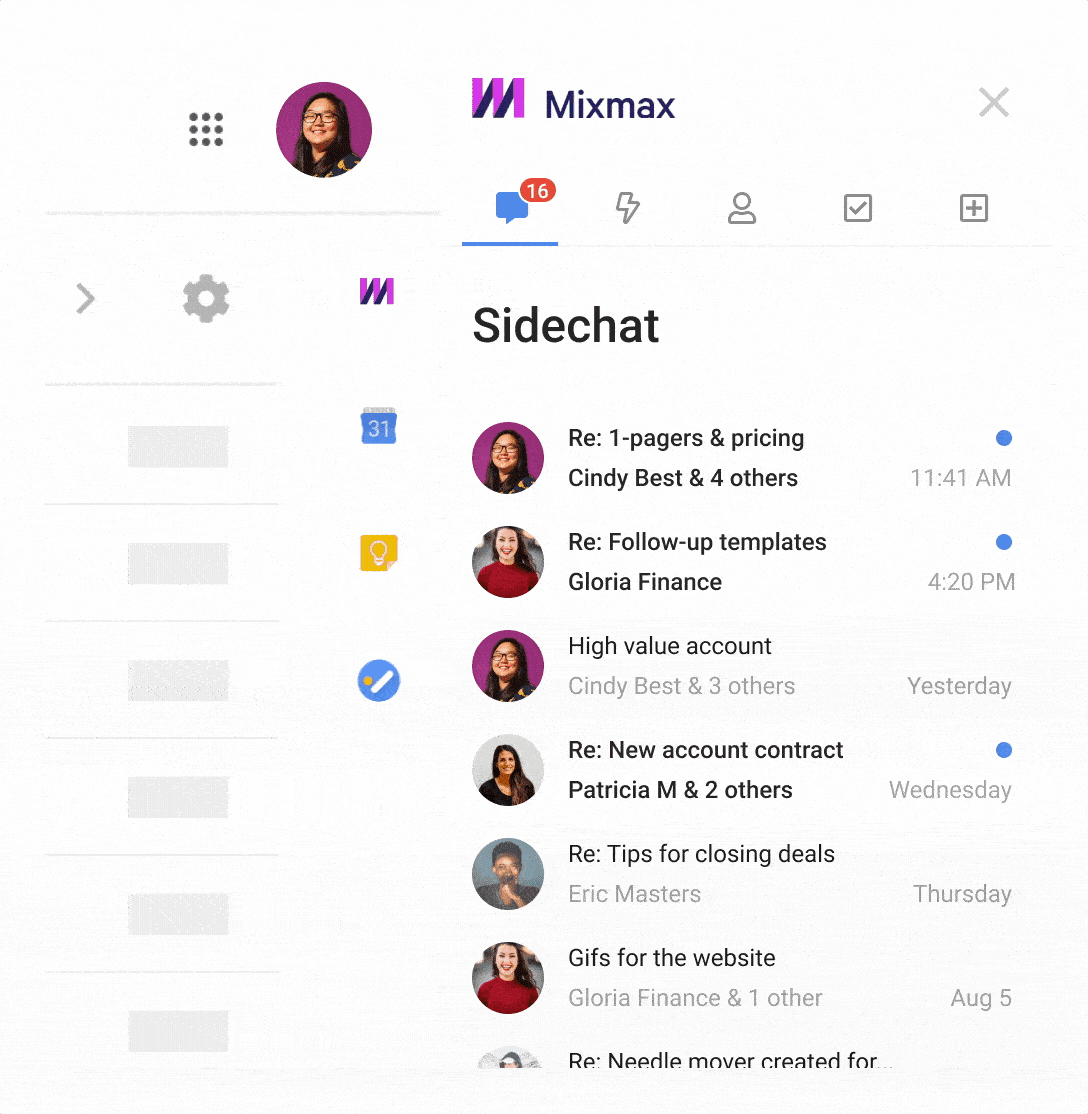Your sales methodology (consultative, inbound, solution selling, etc.) is meaningless without a rock-solid sales process to go along with it. A sales process brings your sales methodology to life by providing reps with a set of repeatable steps to follow.
At Mixmax, we believe that an effective sales process focuses on discovery and solution validation.
Based on our experience, reps who follow these eight steps outperform those who don’t. (No sales process is truly linear, so we use the word “steps” loosely.)
Discovery
1. Don’t Jump Straight into a Demo—Instead, Listen
Discovery is your opportunity to understand the prospective customer’s pain points. It’s not the right time for a demo. A physician who writes prescriptions without diagnosing the illness engages in malpractice. So, why do some reps push products that don’t align with customers’ actual needs? They’re probably moving too fast, trying too hard, or feeling squeezed by their quotas. Turn this into a competitive advantage by taking a different approach. Slow down, ask the right questions, and pay attention to the words that customers use. If the customer refers to sales reps as “account executives,” you should too.
Related Post: 18 Open-Ended Sales Engagement Questions That Help Close Deals Faster
2. Quantify the Customer’s Pain
Guide customers through a series of questions aimed at helping them quantify their pain. If you’re selling software, ask about how much time users spend performing manual tasks and data entry each day, week, or month. Push for specific, measurable data that helps the customer (and you) quantify the true cost of prolonged pain.
Example: During discovery, you learn that a customer spends $20,000 per year in contractor fees, which would be eliminated by your solution. Your solution’s price tag starts at only $10,000, which means there could be a real opportunity to help them cut costs.
3. Start to Understand the Customer’s Timing and Process
Each customer has a different way of handling contracts, negotiations, implementations, and vendor-related processes. Discovery is the right time to begin understanding these processes. Here are a few questions to get the conversation going:
- What does your buying process look like?
- Who needs to be involved to get this type of deal done?
- Will this replace an existing solution that already has a budget?
- What is your legal review process like?
- Do you have a procurement team that will be involved with the process?
Related Post: A Complete Guide to Sales Prospecting
4. Develop a Mutual Action Plan
A mutual action plan (MAP) is a shared document that lists upcoming milestones for you and the customer. Each milestone should have a target due date and an assigned owner. Example milestones might include:
- Product demo
- Contract delivery
- Sign off
- Deposit
- Implementation
- Launch
Introducing a MAP earlier in the sales process keeps both parties on the same page and creates a shared sense of accountability. To keep your MAP on track with less effort, use Mixmax’s smart tracking reminders to receive alerts as customers engage with your milestone-related emails.
Solution Validation
5. Show How Your Product Solves the Customer’s Problem (aka, the Demo)
Once you’ve performed the necessary upfront discovery, it’s time to show how your solution solves the customer’s problems. Separating discovery from solution validation provides breathing room to put together a strategic demo. Your entire presentation should revolve around what you learned during discovery.
If new information presents itself during the demo, be ready to adjust on the fly or schedule a follow-up demo to properly address the situation. Use one-click meetings in Mixmax to rapidly schedule and confirm subsequent demos before hanging up with the customer.
Related Post: The Infamous No: How to Make Objections A Breeze
6. Build a Compelling Business Case
A business case is not a simple calculation of expected ROI—it’s actually a custom-built presentation or document that helps the customer make an informed buying decision. Your business case may vary in formality and content based on the buyer’s company, size, and needs, but its main purpose is to make life easier for those advocating for your solution. A well-crafted business case increases your chances of getting the sale by supporting advocates as they push your solution through the internal buying process.
Bonus tip: Some advocates may ask you to present the business case to their decision-makers. Others will use it as an internal guide. Ask how your business case will be used (and by whom) so you can tailor it to that exact use case.
7. Identify Your Champions
Advocates can be the difference between closing a deal and seeing it go stale. The person you’re currently communicating with may not be the ultimate or only decision-maker. Lean on your existing contacts to understand the dynamics of their company. Some things to think about as you move forward with identifying your internal champions:
- Which stakeholders have the most influence on the decision-making process?
- What types of personalities are involved?
- Who is secretly or openly pulling for your solution?
- Is your business case clear and compelling for each persona group?
- Or, is it too narrowly focused on the needs of one particular stakeholder?
- Which of your existing connections can help you establish a deeper (or new) relationship with other stakeholders?
Related Post: The Difference Between Struggling and Top Sales Reps
8. Get the Deal Done
It’s been said that a deal should close itself when you’ve had the right meetings, established the right champions, and developed the right business case for your buyer. But, things don’t always go as planned. Last-minute security reviews or contract squabbles have sidetracked even the best-fit deals. There’s also plenty of administrative work to get the deal done, such as:
- Preparing and sending contracts to the customer
- Following up to obtain timely sign-off
- Working through vendor onboarding
That’s why you need the right toolbox that accelerates the deal closing process and helps you adapt on the fly. Mixmax Sidechat, for example, makes it easier to collaborate with your team, develop a game plan, and get the deal done. Sidechat lets you quickly add collaborators to any email conversation—without forwarding email threads—so you can tap into the collective genius of your team.

Accelerate Your Sales Process with Mixmax
Mixmax accelerates every step in the sales process—from customer email tracking to one-click scheduling to team collaboration and much more.
Request a demo to see how Mixmax can maximize the impact of your sales process.




